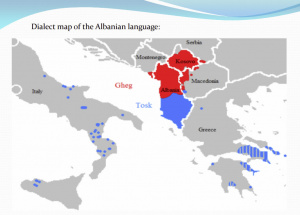Language/Tosk-albanian/Grammar/Adverbs-of-Manner
Introduction
Adverbs of manner are important in any language because they help to convey more meaning about how something is done. In Tosk Albanian, adverbs can be placed in different parts of the sentence to change the meaning of the sentence. In this lesson, we will learn how to use adverbs of manner in Tosk Albanian and their placement. By the end of this lesson, you will be able to add more detail to your sentences.
After mastering this lesson, these related pages might interest you: Definite Articles & To Be and To Have.
Adverbs of Manner
An adverb of manner explains how something is done. In English, adverbs of manner often end with -ly, such as quickly or slowly. In Tosk Albanian, adverbs of manner are formed by adding -sisht at the end of the adjective. Here are some examples:
| Tosk Albanian | Pronunciation | English |
|---|---|---|
| shpejt | [ʃpɛjt] | quickly |
| ngadalë | [ŋɡa'dalə] | slowly |
| bukur | ['bukur] | beautifully |
| keq | [kɛʤ] | badly |
| mirë | ['mirə] | well/good |
| fort | [fɔrt] | strongly |
| çuditshëm | ['ʧuditʃəm] | surprisingly |
As you can see in the table, adverbs of manner in Tosk Albanian are easy to form. All you need to do is add -sisht.
Placement of Adverbs of Manner
In Tosk Albanian, adverbs can be placed in different parts of the sentence to change the meaning of the sentence. Here are a few examples:
- If the adverb is referring to the verb, it is usually placed after the verb. For example:
Unë flas shpejt. (I speak quickly.)
- If the adverb is referring to the adjective, it is usually placed after the adjective. For example:
Ajo është shumë bukur buzëqesh. (She is very beautiful when she smiles.)
- If the adverb is referring to the whole sentence, it is usually placed at the beginning or end of the sentence. For example:
Kurrsesi nuk do të kthehem në rast se ai është aty. (I will never go back if he is there.)
In Tosk Albanian, adverbs of manner can be used to modify a verb or an adjective. Here are a few example sentences:
- Unë vij shpejt. (I come quickly.)
- Ai bën punën fort. (He works strongly.)
- Ajo këndoi bukur. (She sang beautifully.)
Conclusion
Adverbs of manner are an important part of any language. In Tosk Albanian, they are easy to form and can be placed in different parts of the sentence to change the meaning of the sentence. Remember to use adverbs to add more detail and meaning to your sentences. Keep practicing and you'll soon be able to express yourself with more accuracy and precision.
Upon wrapping up this lesson, take a look at these related pages: Conditional Mood & Pronouns.
Other Lessons
- Nouns
- Future Tense
- Give your Opinion
- Personal Pronouns
- Verbs and Present Tense
- Time and Dates
- Question Words
- Conditional Mood
- Pronouns
- Personal pronouns

